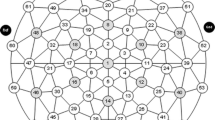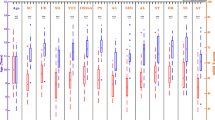Abstract
Cognitive functioning in autistic subjects was investigated by employing ERP recordings. The sample included four autistic patients, with five normal subjects and four Down's syndrome patients serving as the two control groups. The P300 component was investigated under three different experimental conditions, that is; “No-task,” “Counting,” and “Key-press. ” Two out of four autistic subjects were able to perform the required task under the Counting condition. However, none of them were able to complete the task for the Key-press condition. Autistic subjects demonstrated a lower amplitude of the P300 component under the No-task condition as compared to the other two groups. It was speculated that the autistic, as opposed to the other two groups, had some cognitive difficulties in the “active stimulus evaluating process”.
Similar content being viewed by others
Reference notes
Tanaka-Kyouiku-Kenkyujo.Tanaka-Binet test. Tanaka Publ. Co. Ltd.: Tokyo, 1979.
Yataro Suzuki.Suzuki-Binet test. Tokyo-Tosho Publ. Co. Ltd.: Tokyo, 1956.
References
Damasio, A. R., & Maurer, R. G. Neurological model for childhood autism.Archives of Neurology, 1978,35, 777–786.
Donchin, E., Ritter, W., & McCallum, W. C. Cognitive psychophysiology: The endogenous components of ERP. In E. Callaway, P. Tueting, & S. H. Koslow (Eds.),Event-related brain potentials in man. New York: Academic Press, 1978.
Galbraith, G. C., Squires, N., Altair, D., & Gliddon, J. B. Electrophysiological assessments in mentally retarded individuals: From brain stem to cortex. In H. Begleiter (Ed.),Evoked potentials and behavior. New York: Plenum Press, 1979.
Lelord, G., Laffont, F., Jusseaume, P., & Stephant, J. L. Comparative study of conditioning of averaged evoked responses by coupling sound and light in normal and autistic children.Psychophysiology, 1973,10, 415–425.
Novick, B., Kurtzberg, D., & Vaughan, H. G., Jr. An electrophysiologic indication of defective information storage in childhood autism.Psychiatry Research, 1979,1, 101–108.
Novick, B., Vaughan, H. G., Jr., Kurtzberg, D., & Simson, R. An electrophysiologic indication of auditory processing defects in autism.Psychiatry Research, 1980,3, 107–114.
Ornitz, E. M., Ritvo, E. R., Panman, L. M., Lee, Y. H., Carr, E. M., & Walter, R. D. The auditory evoked response in normal and autistic children during sleep.Electroencephalography and Clinical Neurophysiology, 1968,25, 221–230.
Ritter, W., Vaughan, H. G., Jr., & Costa, L. D. Orienting and habituation to auditory stimuli: A study of short-term changes in average evoked responses.Electroencephalography and Clinical Neurophysiology, 1968,25, 550–556.
Roth, W. T., Ford, J. M., Lewis, S. J., & Kopell, B. S. Effects of stimulus probability and task-relevance on event-related potentials.Psychophysiology, 1976,13, 311–317.
Rutter, M. The development of infantile autism.Psychological Medicine, 1974,4, 147–163.
Small, J. G., DeMyer, M. K., & Milstein, V. CNV responses of autistic and normal children.Journal of Autism and Childhood Schizophrenia, 1971,1, 215–231.
Author information
Authors and Affiliations
Rights and permissions
About this article
Cite this article
Niwa, Si., Ohta, M. & Yamazaki, K. P300 and stimulus evaluation process in autistic subjects. J Autism Dev Disord 13, 33–42 (1983). https://doi.org/10.1007/BF01531357
Issue Date:
DOI: https://doi.org/10.1007/BF01531357




